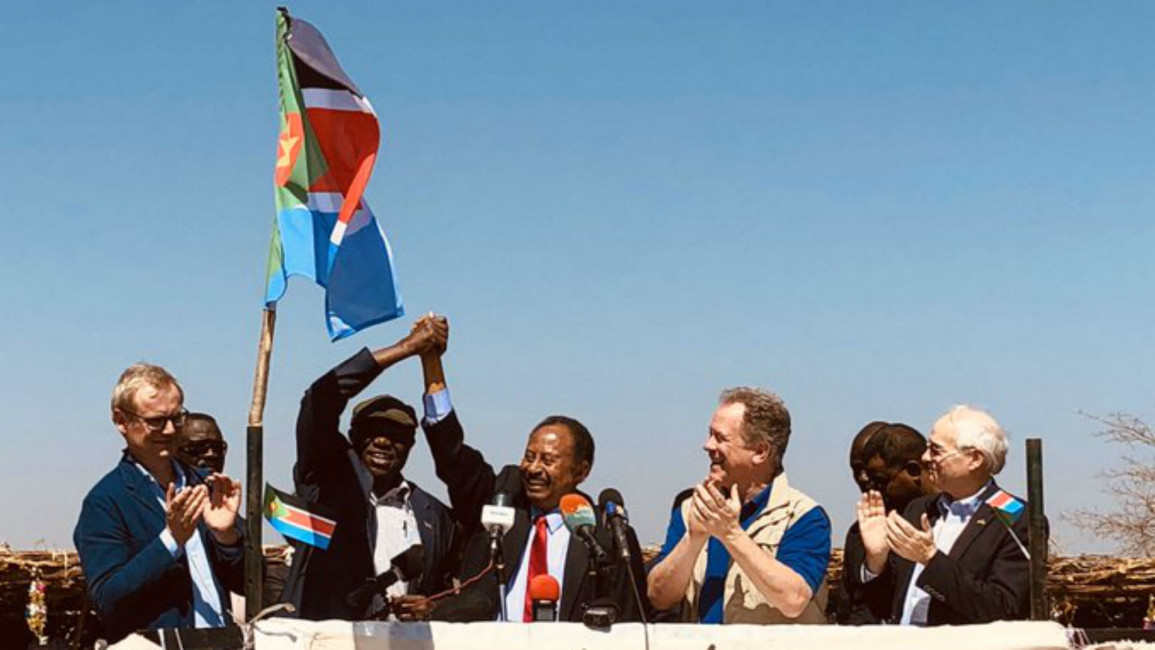Sudan PM makes historic visit to rebel-held south, sparking renewed hopes for peace
American, British and Norwegian diplomats joined the Sudanese government delegation led by Prime Minister Abdalla Hamdok, alongside the chief of the United Nations World Food Programme.
A crowd of tens of thousands of people, including thousands of armed rebels, welcome Hamdok to the town of Kauda, located around 1,000 kilometres (620 miles) south of the capital in southern Sudan's conflict-torn Nuba Mountains.
In Kauda, Hamdok met with Abdel-Aziz al-Hilu, who leads the powerful faction of the Sudan People's Liberation Movement-North (SPLM-N). The country's largest rebel group, Al-Hilu's movement controls significant chunks of territory in the Blue Nile and South Kordofan provinces.
Sudan's transitional government in October launched peace talks with rebel groups from the country's three conflict zones - Darfur, Blue Nile and South Kordofan. The rebels have observed a ceasefire since the overthrow of former dictator Omar Al-Bashir in April last year.
A key goal for Hamdok is to end the conflicts, stabilising the country and helping to lead it out of economic crisis by cutting military spending.
Read more: One year after Bashir's downfall, Sudan's revolutionaries sleep with one eye open
The negotiations held in the South Sudanese capital Juba have so far yielded an agreement between the government and most of the rebels, dubbed the Declaration of Principles, detailing a road map for peace talks and extending a cease-fire in disputed areas.
|
|
The deal also envisaged trust-building measures by the government, such as granting humanitarian access to contested areas across the country, the release of war prisoners and dismissing sentences and charges against rebel leaders.
But several issues pose difficulties in reaching final peace accords.
Continuing violence, some of it allegedly by paramilitary troops, has seen peace talks with rebel groups from Darfur suspended after dozens were killed.
Al-Hilu's demand for a secular state with no role for religion in government has also provided a major sticking point in the talks.
If his demands - which also include the disbanding of all of Bashir's militias and the re-organisation of the Sudanese military - are not met, the SPLM-N will call for self-determination in the areas it controls.
During Thursday's visit, however, relations between Al-Hilu and Khartoum looked hopeful as the rebel chief and prime minister shook hands and smiled warmly before the jubilant crowds.
Hamdok's visit to Kauda, the first of its kind for a senior Sudanese government official in more than nine years, has been hailed by many as a sign of hope for prospects of peace.
"Peace is our top priority," Hamdok said in a tweet. "The people of Sudan have suffered immensely, and this revolution will not be complete unless we recognise the immense grievances of those who have been systematically targeted by those who were responsible for their protection."
The trip to Kauda also marked an historic visit for the World Food Programme. The area has long been stricken by poverty, but fighting has barred aid groups from visiting, making Thursday's visit the second time the WFP has been able to access the area.
|
|
Aid workers brought with them supplies for a school feeding programme that they say is a first step towards addressing dire hunger in Kauda and nearby communities.
"Historic day in Sudan!" said David Beasley, Executive Director of the WFP, in a tweet. "A new milestone in humanitarian access in South Kordofan region."
The Troika has hailed the visit as a "major confidence-building step in the peace process".
"We hope [it] will pave the way for safe and unhindered humanitarian access to all areas and lead to the swift and successful conclusion of peace negotiations by the 14 February deadline agreed by all parties," the US, UK and Norway said in a statement.
Irfan Siddiq, British ambassador to Khartoum, added that the visit signalled "rebuilding of trust, improvement in humanitarian assistance and good prospects for a peace deal".
Agencies contributed to this report
Follow us on Twitter and Instagram to stay connected



